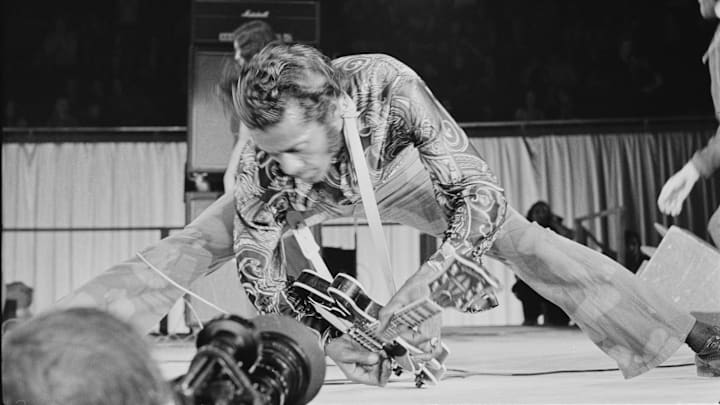Chuck Berry (1926–2017) was an influential American guitarist, singer, and songwriter who played a pivotal role in the development of rock and roll music. He was born on October 18, 1926, in St. Louis, Missouri, and his full name was Charles Edward Anderson Berry. Chuck Berry's innovative guitar playing and energetic stage presence helped define the rock and roll genre in the 1950s. He is often credited with pioneering many elements of rock and roll, including his distinctive guitar riffs, showmanship, and lyrical themes that often focused on teenage life, cars, and dancing.
Chuck Berry: “Hail! Hail! Rock ‘n’ Roll”
Known for his hits like "Maybellene" (a name given to one of his guitars), "Roll Over Beethoven," "Johnny B. Goode," and "Rock and Roll Music," his music offered a fresh slice of American life in lyrical form. Berry's guitar style was characterized by his use of double stops and bending guitar strings (a much rarer technique at the time), and it was augmented by his signature "duck walk" stage move. Anyone striving to play like him Chuck Berry is fated to grasp some core elements of rock music. Basically, people would look at the fretboard differently after he showed up on the scene. His contributions to the genre made him the first inductee into the Rock and Roll Hall of Fame in 1986, along with some other obvious choices.
Legal troubles
Despite his significant influence on the development of rock and roll, Chuck Berry's career faced challenges, including legal troubles. In 1962, the "Father of Rock 'n' Roll" was convicted of violating the Mann Act, a charge related to the transportation of a minor across state lines for "immoral purposes" (there were other scandals related to Berry, but this one says enough). He served time in prison but later made a comeback in the mid-1960s with hits like "No Particular Place to Go."
Of course, Berry wasn't the only musical figure of the time who got in trouble wth the law; Larry Williams, writer of the song "Bony Moronie," was known for his own legal troubles, and folk musician Lead Belly owed at least some of his fame to the fact he had served prison time for murder.
Scandals aside, Chuck Berry continued to perform throughout his career, and his records left a lasting legacy in the world of rock and roll. He died shortly after his final album was made available on Bandcamp. His Bandcamp page notes: "He passed away on March 18, 2017 at the age of 90." His impact on popular music continues to be felt, and his songs remain influential and widely covered by subsequent generations of musicians. Michael Jackson may be called the “King of Pop” andm for some of us, Elvis Presley isn't truly the King of Rock and Roll — it's actually Chuck Berry (if nothing else, he wrote way more of his own songs than Elvis).
Stray facts
- Berry found his big break when he journeyed to Chicago in May 1955 and encountered Muddy Waters, who advised him to get in touch with Leonard Chess, the owner of Chess Records. This fact further ties Muddy Waters into the history of rock and roll.
- Between 1948 and 1950, Berry did factory worked and janitorial work, while becoming a guitarist and developing his musical career.
- Berry is known for blues-based rock, but he made occasional forays into country, especially earlier on in his career. He occasionally did venture into unexpected territory, such as his extended jams with Bo Diddley, where Berry actually showed a relatively more experimental side.
- Willie Dixon plays bass on the track "Maybelline." Dixon had written such influential hits as "Hoochie Coochie Man" (popularized by Muddy Waters), "I Just Want to Make Love to You," "My Babe", "Spoonful", and "You Can't Judge a Book by the Cover."
- In 1955, he recorded "Maybellene", which rose to number one on Billboard's R&B chart, and "Roll Over Beethoven", which is a bit of a light-hearted protest songs against racism that, at times, stood against rock and roll music receiving radio play. Remember: Music featuring black musicians was often branded as "race music" at the time, so classical music was likely perceived as a traditional form that could be presented as a bullwark against newer musical forms.
- In 1982, Berry starred in a TV special, Chuck Berry: Live at the Roxy with Tina Turner, which is pa seemingly overlooked concert film, and surely worth checking out.
- The Chuck Berry song "Run, Rudolph, Run," was also a source of legal trouble for Berry, as he was accused of ripping off the song "Rudolph the Red-Nosed Reindeer."
